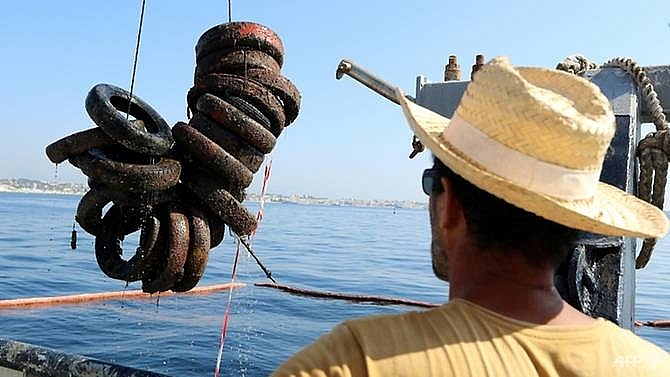France reverses car tyre sea sanctuary - an environmental flop
 |
| Ten thousand tyres are set to be lifted out of the sea by the divers and boat crew over the next few weeks, with the remaining 12,500 extracted in the second quarter of 2019. (Photo: AFP/Valery Hache) |
Since the start of last week, divers and a specially equipped boat with lifting gear have been fishing out hundreds of the old loops of rubber about 500 metres from an exclusive coastline between the towns of Cannes and Antibes.
The original vision, backed by local French authorities at the time and fishermen, was that the tyres would become populated by coral and other sea creatures in a conservation area where fishing was off limits.
In France, the idea of a "tyre reef" was tried only here, but a local academic working on the clean-up operation said authorities in other countries, particularly the United States, had tried the same failed idea.
"We hoped (back in the 1980s) that we could restore aquatic life there, but it didn't work," the deputy mayor of Antibes, Eric Duplay told AFP. "It turns out that the tyre reef was not a prolific place for biomass."
Denis Genovese, the head of an association of local fishermen, confirmed that most Mediterranean lifeforms had shunned the idea of living inside man-made products manufactured out of rubber, resins, oil and other chemicals.
LEAKING TOXIC CHEMICALS
Sedentary creatures such as the local scorpion fish didn't use them, Genovese said, while "grouper fish, conger eels and sea bream swim around them, but no species really got used to it".
Worse, a study in 2005 by researchers at the University of Nice showed that the tyres were leaking toxic chemicals into the environment, including heavy metals, which are a threat to human life.
Authorities were also worried that the tyres could degrade further, nearly 40 years after they sank to the seabed, and break up into smaller pieces which would be a risk for nearby seagrass meadows.
In 2015, a first mission to remove 2,500 tyres was undertaken to show that they could be extracted safely, with the work underway at the moment a second and more important phase of the clean-up operation.
Around 10,000 are set to be lifted by the divers and boat crew over the next few weeks, with the remaining 12,500 extracted in the second quarter of 2019.
REGENERATION HOPES
AFP hopped aboard the vessel last week to watch the progress in action as dozens of tyres were hauled from the sea, with the luxury holiday villas of the French Riviera visible on the coastline behind.
The Saudi royal family owns a huge villa on a small stretch of beach opposite the site, which was the focus of a scandal in 2015 when King Salman tried to privatise the sand for his holiday and caused an uproar among locals.
The fine white sand is a problem for the clean-up team of divers, which struggle with low visibility as they find the tyres and thread them on to wire cables which are then lifted to the surface.
"In the morning, it's easy, the water's clear," crew member Morgan Postic on board the Ocea vessel said. "But as we stir it all up down at the bottom, you can't see anything and it gets much more complicated."
The tyres will be sent to the nearby city of Nice and then to recycling centres where they will be broken up into granules that can be used in construction projects.
"After that we'll leave the seabed to restore itself naturally and we'll continue to monitor with sensors," said marine scientist Patrice Francour from the University of Nice, who is working on the issue.
Francour said the clean-up would end France's one and only experiment with a "tyre reef", but that other countries still had to deal with the legacy of the failed idea, notably the United States.
A million euros has been provided by the French state to finance the French clean-up, while French tyre company Michelin has contributed €200,000 (US$235,000).
What the stars mean:
★ Poor ★ ★ Promising ★★★ Good ★★★★ Very good ★★★★★ Exceptional
 Tag:
Tag:
Related Contents
Latest News
More News
- Russian President congratulates Vietnamese Party leader during phone talks (January 25, 2026 | 09:58)
- Worldwide congratulations underscore confidence in Vietnam’s 14th Party Congress (January 23, 2026 | 09:02)
- Political parties, organisations, int’l friends send congratulations to 14th National Party Congress (January 22, 2026 | 09:33)
- 14th National Party Congress: Japanese media highlight Vietnam’s growth targets (January 21, 2026 | 09:46)
- 14th National Party Congress: Driving force for Vietnam to continue renewal, innovation, breakthroughs (January 21, 2026 | 09:42)
- Vietnam remains spiritual support for progressive forces: Colombian party leader (January 21, 2026 | 08:00)
- Int'l media provides large coverage of 14th National Party Congress's first working day (January 20, 2026 | 09:09)
- Vietnamese firms win top honours at ASEAN Digital Awards (January 16, 2026 | 16:45)
- ASEAN Digital Ministers' Meeting opens in Hanoi (January 15, 2026 | 15:33)
- ASEAN economies move up the global chip value chain (December 09, 2025 | 13:32)






















 Mobile Version
Mobile Version